|
|
|
Sort Order |
|
|
|
Items / Page
|
|
|
|
|
|
|
| Srl | Item |
| 1 |
ID:
133845
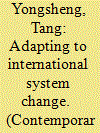

|
|
|
|
|
| Publication |
2014.
|
| Summary/Abstract |
Understanding the transition happening in the international system requires a balance between old logic and new reality. As the power pattern changes and the characteristics of international order unfold, the complications of global politics, casual relationships among different issues, and the echoing effects of strategic choices will lead to greater need for global governance. The logic of simple power politics will not be enough when strategists confront nontraditional challenges.
|
|
|
|
|
|
|
|
|
|
|
|
|
|
|
|
| 2 |
ID:
133161
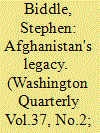

|
|
|
|
|
| Publication |
2014.
|
| Summary/Abstract |
The war in Afghanistan is not over. Nor is it ending any time soon. The U.S. role may end in 2016, in whole or in part, but the war will continue-and its ultimate outcome is very much in doubt. The conflict is now stalemated militarily, and will likely stay that way as long as outsiders pay the large bills needed to keep the Afghan National Security Forces (ANSF) in the field and fighting. The war will thus grind onward until this funding dries up or the two sides negotiate a compromise settlement, neither of which is imminent. Depending on how any talks unfold, historians in 2050 could thus look back on this war as a costly but tolerable outcome for the West, as a wasteful disaster, or as something in between; for now, all we know for sure is that it continues.
|
|
|
|
|
|
|
|
|
|
|
|
|
|
|
|
| 3 |
ID:
132917
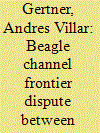

|
|
|
|
|
| Publication |
2014.
|
| Summary/Abstract |
The Beagle Channel crisis (1977-1984) unfolded in a global political context. In other words, it was never solely a bilateral matter between Argentina and Chile, as many analyses have suggested. From the international arbitration to the participation of a third actor (the Vatican), the role of the United States, the Falklands war and the United Kingdom, the Beagle crisis had pronounced regional and international dimensions. Domestic structures and international conditions affected the Argentinian and Chilean foreign policies to different degrees. The Beagle crisis resolution has been explained by reference to the key role played by the Vatican. However, recently declassified US documents and interviews with key actors reveal a different story. International sanctions for human right violations were affecting both countries' leverage in the international community and creating internal political problems. This finding suggests that both countries were keen to use mediation as a strategy to remove human rights violations from the US agenda.
|
|
|
|
|
|
|
|
|
|
|
|
|
|
|
|
| 4 |
ID:
133853
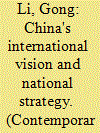

|
|
|
|
|
| Publication |
2014.
|
| Summary/Abstract |
The global order was set in place following the end of the Second World War by a consortium of western countries headed by the U. S. since then, major western countries have strived to maintain their long dominance in global politics and economics. With the rise of nationalist movements, former colonies gained their independence, and many developing countries joined the UN in recent years the economies of the emerging powers have grow rapidly and they have also joined WTO.
|
|
|
|
|
|
|
|
|
|
|
|
|
|
|
|
| 5 |
ID:
133690
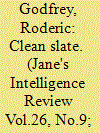

|
|
|
|
|
| Publication |
2014.
|
| Summary/Abstract |
As Syria's declared chemical weapons are destroyed, Roderic Godfrey assesses whether their destruction has stopped the Syrian regime from contravening its new international obligations, and the dilemma faces by the international community.
|
|
|
|
|
|
|
|
|
|
|
|
|
|
|
|
| 6 |
ID:
134207
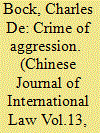

|
|
|
|
|
| Publication |
2014.
|
| Summary/Abstract |
With the end of the Cold War, military interventions in the name of an "expanded" interpretation of self-defense or in the name of humanitarian intervention have taken front stage. Hence the deep Third World support for the resurgence of the individual crime of aggression, through which they want to replace the concept of aggression front and centre before the international community. To counter any political use of the notion of aggression, Third World States want clear and unalterable definitions of both the crime of aggression and of State aggression, with this latter being an element of the former. In this article, after having shed light on the Third World's role in the long road to defining the individual crime of aggression and the State aggression underlying it, we will thus evaluate this effort. We will attempt to show that there is a strong possibility that any push towards criminalizing aggression at the level of the individual will not accomplish the desired goal. It could also severely backlash against the Third World States. We think there is a real risk that the accused standing before international criminal tribunals will be prejudiced by the power play that pervades international politics, however rigid the definition of the crime.
|
|
|
|
|
|
|
|
|
|
|
|
|
|
|
|
| 7 |
ID:
134210
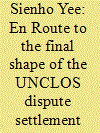

|
|
|
|
|
| Publication |
2014.
|
| Summary/Abstract |
This paper highlights several pivotal negotiating procedural steps that ultimately helped to promote the emergence of the final shape of the UNCLOS dispute settlement system. These steps include, for want of better phrasing, the following: (1) the package deal decision; (2) the consensus approach; (3) building consensus by privileging the best second choice; (4) building consensus by privileging the existing negotiating text through the rule of silence; and (5) failing consensus in the Negotiating Group, the Chairman presenting his own proposals as suggestions to the plenary. Needless to say, these steps are worthy of consideration by future treaty-makers and leaders in treaty-making when they are faced with complicated negotiating tasks, even if not as difficult as those during the monumental UNCLOS III.
|
|
|
|
|
|
|
|
|
|
|
|
|
|
|
|
| 8 |
ID:
133272
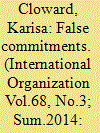

|
|
|
|
|
| Publication |
2014.
|
| Summary/Abstract |
A substantial international relations literature addresses the various ways in which international actors, and the norms they promote, influence state behavior. But less attention has been paid to the influence these actors directly exert at the local level, despite the fact that many transnational campaigns promote norms for which individuals-not states-are the primary transgressors. If individuals behave as some states do, publicly embracing international norms only because they expect a financial or reputational benefit from doing so, then the campaigns have not fully succeeded. But when do individuals engage in real behavior change, and when do they simply change the public image they present to the international community? To begin to address this question, I employ a randomized field experiment to evaluate individuals' willingness to make claims that differ from their true normative commitments. I conducted the experiment in the context of an original 2008 opinion survey about female genital mutilation and early marriage, run in rural Kenya. I find that respondents misrepresent their behavior and intentions, and I supplement these findings with an exploration of causal mechanisms through qualitative interviews.
|
|
|
|
|
|
|
|
|
|
|
|
|
|
|
|
| 9 |
ID:
134008
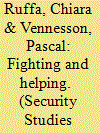

|
|
|
|
|
| Publication |
2014.
|
| Summary/Abstract |
In complex humanitarian emergencies, why are NGO-military relations cooperative in some cases, yet deeply conflictual in others? Drawing on historical-institutionalist theoretical insights, we argue that NGOs and military organizations are embedded in, and responding to, domestic institutional configurations that define a set of political incentives and constraints, material and normative, which structures and influences the characteristics and outcomes of their relations. Counterarguments suggest that organizational differences and the nature of their missions affect NGO-military relations. Using fresh empirical evidence we assess these arguments by comparing the Italian and the French experiences of NGO-military relations during the NATO-led International Security Assistance Force (ISAF) mission in Afghanistan and the UN mission in Lebanon (UNIFIL II) between 2007 and 2011.We find that domestic institutional configurations are not left behind when NGOs and military units deploy abroad. Rather, they shape NGOs' and militaries' capacity to work together instead of at cross purposes and ultimately influence the success of international action.
|
|
|
|
|
|
|
|
|
|
|
|
|
|
|
|
| 10 |
ID:
133850
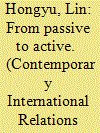

|
|
|
|
|
| Publication |
2014.
|
| Summary/Abstract |
As one of the victorious allies of World War - I, China attended the Paris Peace Conference in 1919. Toa certain extent, the conference can be regarded as the true beginning of global governance. It was followed by the establishment of the Versailles-Washington System. The first international pattern with world participation
|
|
|
|
|
|
|
|
|
|
|
|
|
|
|
|
| 11 |
ID:
134007
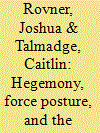

|
|
|
|
|
| Publication |
2014.
|
| Summary/Abstract |
International relations theories emphasize the stabilizing role hegemons play in world politics. But little scholarship has examined the link connecting hegemony to its potentially positive returns in the security realm: force posture. We correct this deficit by developing and testing an argument about the consequences of different hegemonic force postures under varying threat conditions. We present a typology of force posture options and probe their effects through over-time analysis of how major powers have worked to provide one particularly important public good since 1945: access to Persian Gulf oil. Drawing on field work, we also explore the implications of our framework for current and future US force posture in the region. We conclude that hegemonic stability is a very real phenomenon in the Gulf, but it does not require the massive forward deployment of US forces that has characterized the past twenty years of US presence there.
|
|
|
|
|
|
|
|
|
|
|
|
|
|
|
|
| 12 |
ID:
133854
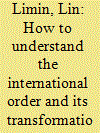

|
|
|
|
|
| Publication |
2014.
|
| Summary/Abstract |
What is the international order? Professor Zhoa Xiaochun define it as the standards and specifications established by the members of the international system in order to maintain its stability and normal operation as well coordinating and addressing international affairs, and acting as a guarantee mechanism, a decision making process and providing rules of agenda.
|
|
|
|
|
|
|
|
|
|
|
|
|
|
|
|
| 13 |
ID:
134085
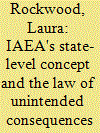

|
|
|
|
|
| Publication |
2014.
|
| Summary/Abstract |
In September 2013, the International Atomic Energy Agency (IAEA) Board of Governors reviewed a report by Director-General Yukiya Amano on efforts to further strengthen the effectiveness of safeguards and increase their efficiency.[1] The report described an approach to the implementation of safeguards that had come to be known as the "state-level concept."
|
|
|
|
|
|
|
|
|
|
|
|
|
|
|
|
| 14 |
ID:
133776
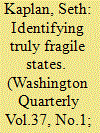

|
|
|
|
|
| Publication |
2014.
|
| Summary/Abstract |
That the Arab Spring caught the world off guard is hardly surprising. Interpreting overt stability as a reflection of fundamental strength or resiliency has often set the international community up for surprise. Few forecast the dissolution of the Soviet Union, for example; far too few in Washington anticipated what would follow the invasion of Iraq. These are reminders that apparent stability can be little more than an illusion.
|
|
|
|
|
|
|
|
|
|
|
|
|
|
|
|
| 15 |
ID:
133844
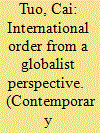

|
|
|
|
|
| Publication |
2014.
|
| Summary/Abstract |
In his book the Anarchical society : A study of order in world politics, Hedley Bull defined international order as a behavior pattern resulting from pursuit of purposes by nations or international community.
|
|
|
|
|
|
|
|
|
|
|
|
|
|
|
|
| 16 |
ID:
133280
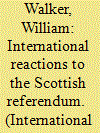

|
|
|
|
|
| Publication |
2014.
|
| Summary/Abstract |
The referendum on whether Scotland should become an independent country will be held on 18 September 2014. This article reflects on the evolution of foreign governments' attitudes towards the referendum since its confirmation in October 2012, and on their expectations should a 'yes' vote result. With few exceptions, they have adopted a policy of non-intervention, treating the referendum as the UK's domestic affair. President Obama's expression on 5 June 2014 of his desire for the UK to remain 'a strong, robust, united and effective partner' may, however, be seen as a sign of increasing apprehension abroad. Concerns of foreign governments aroused by the referendum include the diminution of the UK's power and role in international affairs, the possible encouragement of other secessionist movements, and disturbance to international organizations and alliances. It is commonly assumed that Scotland would become a reasonably prosperous and reliable small state. But how would the rest of the UK (rUK), a much more powerful and populous country, respond to 'the loss of Scotland'? How would it affect the UK's already unsettled relations with the EU, including the prospect of a referendum on EU membership? Despite many uncertainties and a febrile political atmosphere, it is widely expected abroad that Scotland and rUK would settle into a cooperative relationship after a difficult transitional period, and that an independent Scotland would be accepted into the EU and NATO if it displayed flexibility on important issues.
|
|
|
|
|
|
|
|
|
|
|
|
|
|
|
|
| 17 |
ID:
133956
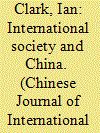

|
|
|
|
|
| Publication |
2014.
|
| Summary/Abstract |
The core suggestion of this article is that we make best sense of the concepts of power, legitimacy, and responsibility within a framework of international society. This framework is illustrated by, and applied to, the specific case of China's rise. In the light of its historical background, a rising China faces a major paradox. Seemingly, the prerequisite for it to exercise greater influence on the norms of international society is yet further assimilation into them: in order to become a respected norm maker, China must first be seen to be fully integrated as an appropriate norm taker. To be in a position to influence the norms of international society, China must seemingly firstly resolve any lingering ambiguities about its membership. In short, should the debates about China's status be understood as an expression of the power of norms (where China is assessed relative to some universal standard of responsibility), or are they better viewed as the deployment of the norms of power in such a way as to impact its social distribution to China's disadvantage (by imposing the self-interested standards of the liberal states)?
|
|
|
|
|
|
|
|
|
|
|
|
|
|
|
|
| 18 |
ID:
132918
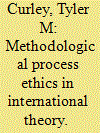

|
|
|
|
|
| Publication |
2014.
|
| Summary/Abstract |
In this review essay, I identify a commonality between Patrick Thaddeus Jackson's The Conduct of Inquiry and Daniel J. Levine's Recovering International Relations: an ethical methodological process to organize international theories in ways that promote a plurality of visions. Jackson's ideal-typification of the various methodological approaches in international relations encourages a pluralistic science. Likewise, Levine's constellation method demands a multiplicity of theoretical perspectives, in order to sustain the critical elements intrinsic to each. As I argue, this shared methodological process ethic not only advances theoretical pluralism but, in so doing, actively opens thinking space for constructing alternative political realities.
|
|
|
|
|
|
|
|
|
|
|
|
|
|
|
|
| 19 |
ID:
134205
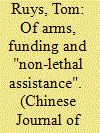

|
|
|
|
|
| Publication |
2014.
|
| Summary/Abstract |
In spite of legal objections, the European Union (EU) in May 2013 gave the conditional green light for the transfer of arms to the Syrian Opposition Council. The EU's decision is not a solitary move. Several other States, including Russia, the United States, Qatar and Saudi Arabia, have provided arms, funding and/or "non-lethal assistance" either to the Syrian government or to rebel forces combatting the Assad regime. The present contribution aims to shed light on the legality of such assistance. On the one hand, it assesses legal objections related to the fact that third-State assistance is used for the commission of widespread war crimes and human rights violations. On the other hand, it examines the compatibility of such assistance with the non-intervention principle and, in so doing, examines to what extent the latter principle discriminates between de jure governments and non-State armed groups in the context of a civil war.
|
|
|
|
|
|
|
|
|
|
|
|
|
|
|
|
| 20 |
ID:
133957
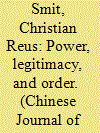

|
|
|
|
|
| Publication |
2014.
|
| Summary/Abstract |
Legitimacy is not something distinct from power; it is one of the vital sources of power. And if power shapes the nature and development of international orders, then the politics of legitimacy features prominently in the construction, maintenance, and dissolution of such orders. This article begins by exploring the concepts of power and legitimacy, their theoretical interconnection, and the impact that crises of legitimacy have on the maintenance of political power. It then takes an empirical turn, examining, however briefly, two sites in which the politics of legitimacy had a profound effect on the development of the modern international order. The first concerns the globalization of the system of sovereign states, a four-century long process of imperial extension, crisis, and fragmentation into successor states, a process in which struggles over individual rights played a key role. The second concerns the definition and distribution of special responsibilities for managing functional challenges among states. In orders characterized by formal sovereign equality, on the one hand, and imbalances of material capabilities, on the other, a mechanism needs to be found for containing and harnessing power to meet the problems faced by the international community. Historically, this has been achieved through the allocation of special responsibilities to particular states, usually great powers. But if regimes of special responsibilities create patterns of more or less formal hierarchy among states, they are also sites of intense battles over legitimacy.
|
|
|
|
|
|
|
|
|
|
|
|
|
|
|
|
|
|
|
|
|